|
|
|
Sort Order |
|
|
|
Items / Page
|
|
|
|
|
|
|
| Srl | Item |
| 1 |
ID:
142474
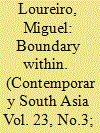

|
|
|
|
|
| Summary/Abstract |
Many inhabitants of Azad Jammu and Kashmir (AJK) hold the belief that their society is not only more egalitarian today than that of their forefathers', but also more egalitarian than that in Pakistan. According to them, Pakistani society continues to be highly hierarchical with stark class and caste-like boundaries, while in AJK these boundaries have become weaker and merely symbolic since the 1970s due to changes in four interconnected factors; namely, migration patterns, land ownership, access to education, and democratic politics. This created an unprecedented level of social mobility among and within biradaris, the caste-like kinship corporate entities that are the crucial social boundary in this region. Yet, the main factor dictating membership in the biradari – endogamy – did not change, and access to power and resources is still determined mostly through biradari-ism. In this paper, I examine how notions of hierarchy and social stratification evolved over time and what contributed to this evolution. I argue and conclude that AJK society is still hierarchical but it has gained an element of fluidity.
|
|
|
|
|
|
|
|
|
|
|
|
|
|
|
|
| 2 |
ID:
073456
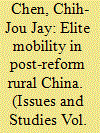

|
|
|
| 3 |
ID:
101202
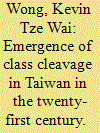

|
|
|
|
|
| Publication |
2010.
|
| Summary/Abstract |
This paper shows that, in Taiwan, political cleavage based on class (class cleavage) has developed since the beginning of the new millennium due to the increasingly important issue of cross-Strait economic integration.Class groups with more skills that benefit from this integration and the less skilledwho are harmed by it are polarized into two opposite camps.Responding to these class groups, the twomajor political camps in Taiwan incorporate this issue into their political platforms. The pan-Blue coalition urges further cross-Strait economic integration, while the pan-Green coalition holds the opposite view. Using the datasets of the Taiwan Social Change Survey (????????), this paper demonstrates that in the 2001 and 2004 legislative elections as well as in the 2004 presidential election,class groups oriented in favor of cross-Strait economic integration have allied with the pan-Blue coalition, while the opposing class groups support the pan-Green coalition.
|
|
|
|
|
|
|
|
|
|
|
|
|
|
|
|
| 4 |
ID:
177552
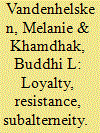

|
|
|
|
|
| Summary/Abstract |
This paper explores the process of construction of the interconnection between ethnicity, indigeneity, and political participation in Sikkim concerning the Limbu ethnic community. It firstly discusses Limbu associations’ claims for the reservation of seats for the Limbu community in the state legislative assembly, following the recognition of the group as a Scheduled Tribe in 2003. From this point on, the paper goes further back in time, and, based on archival documents, shows that the view of the lack of political representation of the Limbu as a result of ethnic discrimination is grounded in a ‘uncertain’ membership, which has historical roots dating back to the foundation of the kingdom. It shows that the troubled relations between the Limbu and the leading power in Sikkim in the early days of the kingdom long continued to inform their subaltern form of political membership.
|
|
|
|
|
|
|
|
|
|
|
|
|
|
|
|
| 5 |
ID:
138448
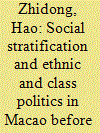

|
|
|
|
|
| Summary/Abstract |
This article examines the changes in ethnic and class politics before and after the handover of Macao in 1999. Even though the domination of Macao politics has largely transferred from the Portuguese and Macanese to the Chinese, the former two groups still retain much power in the legal arena. The Chinese upper class played an instrumental role in Macao politics before the handover and became fully dominant after 1999. For example, they have maintained a large presence on the Executive Committee and in the Legislative Assembly, successfully prevented further democratisation, and protected their interests by delaying the legislation of a minimum wage and barring the collective bargaining power of workers. The working class’ main interests fall in the area of wage increases and protecting their jobs from imported labour. However, they would occasionally join forces with the middle-class movement for democratisation. This article uses statistical data from various sources and applies the critical approach in sociology, namely, historical-comparative analysis, to the study of ethnic and class politics. This analysis will shed light on a scarcely studied issue in Macao and its future prospects of democratisation.
|
|
|
|
|
|
|
|
|
|
|
|
|
|
|
|
|
|
|
|
|